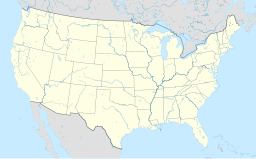East Stroudsburg, Pennsylvania
| Borough of East Stroudsburg US | |
| Settlement | |
|
East Stroudsburg's borough hall
|
|
| Country | United States |
|---|---|
| State | Pennsylvania |
| County | Monroe |
| Elevation | 466 ft (142.0 m) |
| Coordinates | 41°00′05″N 75°10′48″W / 41.00139°N 75.18000°WCoordinates: 41°00′05″N 75°10′48″W / 41.00139°N 75.18000°W |
| Area | 2.5 sq mi (6.5 km2) |
| - land | 2.5 sq mi (6 km2) |
| - water | 0.0 sq mi (0 km2), 0% |
| Population | 11,922 (2010) |
| - metro | 176,567 µSA |
| Density | 4,768.8/sq mi (1,841.2/km2) |
| Timezone | EST (UTC-5) |
| - summer (DST) | EDT (UTC-4) |
| ZIP Codes | 18301-18302 |
| Area code | 570 |
|
Location of East Stroudsburg in Monroe County
|
|
|
Website: www |
|
East Stroudsburg is a borough in Monroe County, Pennsylvania, United States. It is located in the Poconos region of the state. Originally known as "Dansbury," East Stroudsburg was renamed for geographic reasons when the Delaware, Lackawanna, and Western Railroad opened a station in town. It lies east of Stroudsburg and is somewhat more populous than that town. East Stroudsburg is the largest municipality in the East Stroudsburg, PA Metropolitan Statistical Area as designated by the Office of Management and Budget based on data from the 2010 US Census.
East Stroudsburg is located at 41°0′5″N 75°10′48″W / 41.00139°N 75.18000°W (41.001442, -75.180111). According to the United States Census Bureau, the borough has a total area of 2.9 square miles (7.5 km2), all of it land. When traveling west on Interstate 80, East Stroudsburg is the second town from the NJ-PA border on exit 309.
As of the 2010 United States Census, there were 9,840 people residing in the borough. The racial makeup of the borough was 73.2% White, 10.0% Black, 0.1% Native American, 2.4% Asian, 0.3% from some other race and 2.0% from two or more races. 11.8% were Hispanic or Latino of any race.
The area of Stroudsburg was first permanently settled in 1738, when James Monroe received a warrant of 600 acres in Bucks County, now Monroe County along the east bank of the Analomink or Smithfield Creek; now named Brodhead Creek. An additional warrant for 150 acres on the west bank was given to Brodhead in 1750. Brodhead, a judge, was friendly with the local Indians, as well as with the Moravian missionaries who came to the area from Bethlehem, Pennsylvania.
...
Wikipedia




